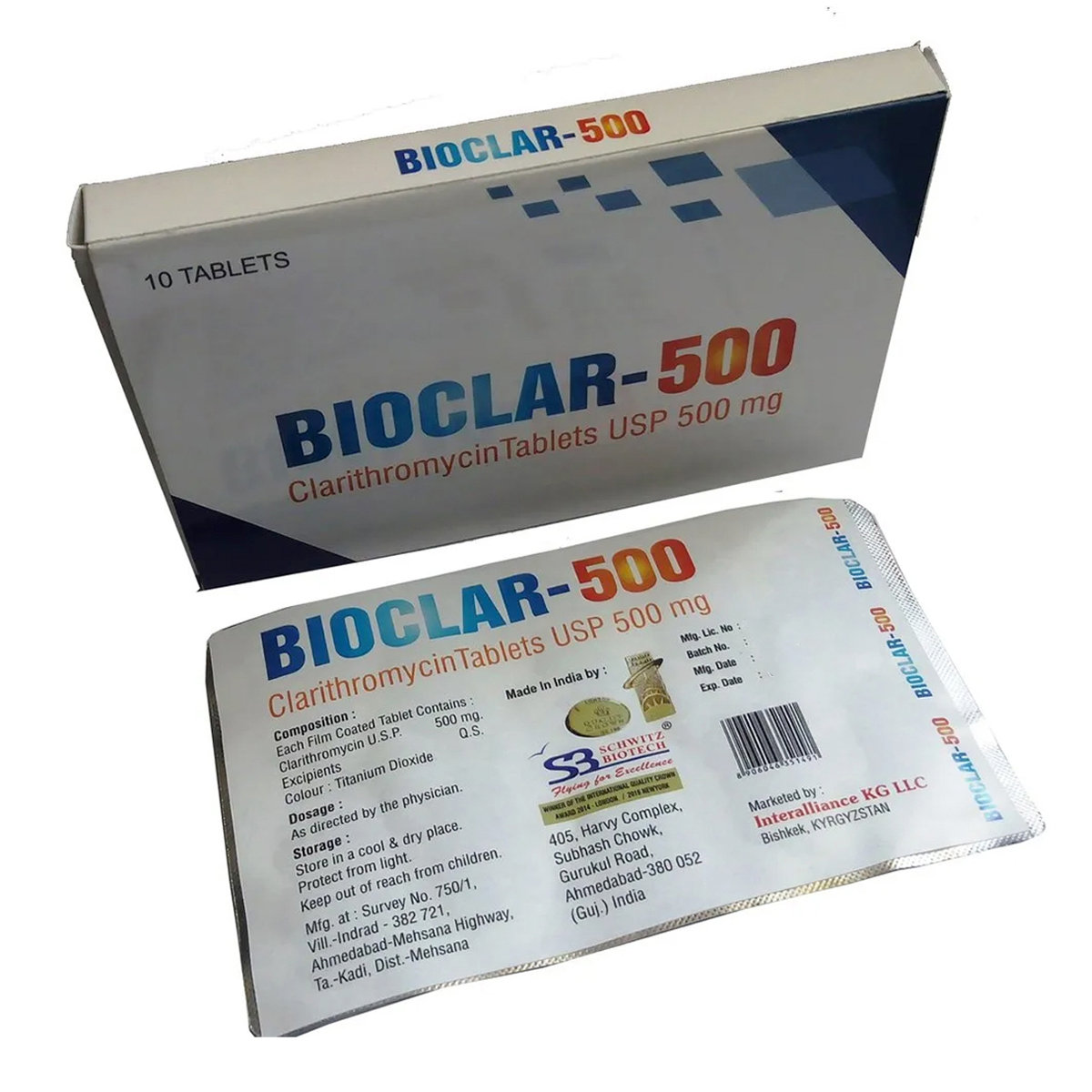Clarithromycin
About Clarithromycin
Clarithromycin is used to treat bacterial infections, including chest infections such as bronchitis and pneumonia, skin problems such as cellulitis, and ear infections. Besides this, Clarithromycin is also used in combination with other medicines to treat duodenal ulcers caused by H. pylori.
Clarithromycin contains Clarithromycin (antibiotic). It inhibits the protein synthesis process required for the growth of the bacterial cell. As a result, bacterial cells are not able to reproduce and grow. Thus, Clarithromycin helps treat infections.
Clarithromycin may cause side effects, including nausea, diarrhoea, vomiting, loss of appetite, bloating, indigestion, headaches, and difficulty sleeping. These side effects are temporary and may resolve after some time; however, if they persist, let your doctor know.
Do not take Clarithromycin if you are allergic to any of its components. Consult your doctor if you are pregnant or breastfeeding. Keep your doctor informed about your health condition and medications to prevent any interactions.
Uses of Clarithromycin
• Treatment of Respiratory Infections: Clarithromycin is commonly prescribed to treat respiratory infections such as bronchitis and pneumonia caused by susceptible bacteria.
• Skin Infections: Clarithromycin effectively treats skin infections like cellulitis or impetigo, caused by bacterial pathogens.
• Sinusitis: Clarithromycin is used to manage acute bacterial sinusitis, relieving symptoms like nasal congestion and facial pain caused by bacterial infections.
• Otitis Media: Clarithromycin is frequently utilized to treat middle ear infections (otitis media), providing relief from ear pain and inflammation.
Medicinal Benefits
- Clarithromycin is a macrolide class antibiotic used to treat a wide range of bacterial infections.
- It is effective against both gram-positive and gram-negative bacteria, certain anaerobic organisms, and some parasites such as Balantidium coli and Entamoeba species.
- It is commonly prescribed for chest and lung infections like bronchitis and pneumonia.
- It helps treat bacterial skin infections such as cellulitis.
- It is beneficial in treating middle ear infections and throat infections caused by susceptible bacteria.
- When used in combination with other drugs, Clarithromycin aids in eradicating Helicobacter pylori, the bacteria responsible for duodenal ulcers.
- By stopping the growth and multiplication of bacteria, Clarithromycin helps clear infections and promotes faster recovery.
Directions for Use
- Clarithromycin can be taken with or without food or as advised by your doctor.
- Follow your doctor's instructions on the dosage and timing of this medication.
- Swallow Clarithromycin as a whole with a glass of water.
- Do not crush, break, or chew it.
Storage
Side Effects of Clarithromycin
- Headache
- Diarrhoea
- Being sick (vomiting)
- Nausea (feeling sick)
- Loss of appetite
- Taste change
- Bloating
- Indigestion
- Abdominal pain
- Insomnia (difficulty sleeping)
Drug Warnings
- Avoid taking Clarithromycin if you are allergic to any of the components present in it.
- In some cases, the use of Clarithromycin causes antibiotic-associated diarrhoea.
- Clarithromycin may cause sensitive skin to react to sunlight and ultraviolet rays, leading to an exaggerated sunburn reaction. Hence, it is advisable to apply sunscreen before going outside.
- Consult your doctor if you are pregnant or breastfeeding.
- Let your doctor know if you are taking any other medicines, including supplements or herbal products.
Drug Interactions
Drug-Drug Interactions: Inform your doctor if you are taking antibiotics (azithromycin, amoxicillin/clavulanate), a statin medicine to lower your cholesterol (simvastatin and atorvastatin), medications used for blood thinners (warfarin), drugs used for heart problems (digoxin), certain medicines used for gout (colchicine), asthma medications (theophylline, budesonide/formoterol), medicines for epilepsy, (carbamazepine and phenytoin), and drugs used to treat migraines (ergotamine and dihydroergotamine).
Drug-Food Interactions: Food containing calcium and iron should be avoided as it may affect Clarithromycin effectiveness. Also, prevent the intake of grapefruit or grapefruit juice with Clarithromycin. Avoid alcohol intake as it may lead to drowsiness and affect Clarithromycin absorption.
Drug-Disease Interactions: Clarithromycin should not be given to people with liver or kidney problems, cardiovascular disorders (fast, pounding or irregular heartbeats), QT prolongation, colitis (a chronic digestive disease characterised by inflammation of the inner lining of the colon), abnormally low levels of potassium in your blood and muscle disease (myasthenia gravis).
Drug-Drug Interactions Checker List:
Safety Advice
Alcohol
consult your doctorLimited information is available. Keep your doctor informed if you drink alcohol.
Pregnancy
cautionClarithromycin should be used in pregnant women only if clinically needed, and the benefits outweigh the risks.
Breast Feeding
cautionLet your doctor know if you are a nursing mother before taking Clarithromycin; your doctor will decide whether Clarithromycin can be taken by breastfeeding mothers or not.
Driving
consult your doctorNot enough scientific data available, hence it is advised to consult your doctor.
Liver
cautionClarithromycin to be taken with caution, especially if you have a history of liver diseases/conditions. The dose may have to be adjusted by your doctor.
Kidney
cautionClarithromycin to be taken with caution, especially if you have a history of kidney diseases/conditions. The dose may have to be adjusted by your doctor.
Children
safe if prescribedClarithromycin can be given safely to children above 6 months of age, with the dose to be adjusted and recommended by a child specialist only.
Habit Forming
Diet & Lifestyle Advise
- Probiotics and prebiotics can also help to reduce the side effects of antibiotics.
- Include more fibre-enriched food in your diet, as it can be easily digested by your gut bacteria, which helps stimulate their growth. Thus, fibre foods may help restore healthy gut bacteria after a course of antibiotics. Whole grains like whole-grain bread and brown rice should be included in your diet.
- Eating grapefruit during antibiotic treatment can prevent the body from utilising Clarithromycin properly. So, avoid intake of grapefruit or grapefruit juice with the antibiotic.
- Avoid taking too much calcium, iron-enriched foods and drinks as it might affect the working of Clarithromycin.
- Avoid the intake of alcoholic beverages, as it can make you dehydrated and affect your sleep. This can make it harder for your body to aid the medicine in fighting off infections.
Special Advise
Iron and antacids (like magnesium hydroxide and aluminium hydroxide) may bind to Clarithromycin in the gastrointestinal tract, lowering its efficiency. So, a gap of at least 2 hours should be maintained between the intake of Clarithromycin and iron supplements and antacids.
Patients Concern
Disease/Condition Glossary
Bacterial infections: A bacterial infection is a condition in which harmful bacteria enter, multiply, and infect our body. It can target any body part and multiply very quickly. When you get infected with bacteria, you can experience generalised symptoms like fevers, chills, and fatigue. Bacteria are of various forms, commonly spherical, rod, and spiral-shaped. Bacterial infections vary from minor illnesses like sore throat and ear infections to severe brain infections like meningitis and encephalitis. A few harmful bacteria that cause infections include Streptococcus, Staphylococcus, and E. coli. Anyone can become infected with a bacterial infection. However, people with weak immune systems or taking immunosuppressive medicine can be more prone to bacterial infection.
FAQs
Clarithromycin is used to treat bacterial infections, including chest infections, skin infections, and ear infections. Besides this, Clarithromycin is also used in combination with other medicines to treat duodenal ulcers caused by H. pylori.
Clarithromycin contains Clarithromycin (antibiotic). It inhibits the protein synthesis process required for the growth of the bacterial cell. As a result, bacterial cells are not able to reproduce and grow. Thus, Clarithromycin helps in the prevention of infections.
You should avoid taking iron supplements, multivitamins, calcium supplements, antacids, or laxatives within 2 hours before or after taking Clarithromycin. Avoid taking any other antibiotics containing Clarithromycin unless your doctor has prescribed you.
After taking antibiotics such as Clarithromycin, some people get thrush, a fungal infection. This is due to the fact that antibiotics kill the regular, harmless bacteria that serve to protect you from thrush.
Clarithromycin treats only bacterial infections. It will not work for viral infections (such as the common cold, flu).
No, Clarithromycin is a macrolide antibiotic. It can be taken by people who are allergic to penicillin with a doctor's advice only.
Side effects are rare with Clarithromycin and do not usually last long. They will get better after a day or two. If any side effects persist, reach out to the doctor immediately.
No, Clarithromycin should not be stopped even if you feel better, as it is an antibiotic medication and completing the full course is very necessary; otherwise, the infection might reappear in a more severe form.






